Stuart Aken's Blog, page 223
October 28, 2014
#BookADayUK; A Reader Event For October. Day 28
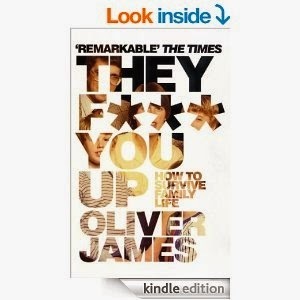 The theme for today is 'Has the best advice'. For me, this was a simple one. Some time ago, I read Oliver James' They F**k You Up: How to Survive Family Life. It's a singularly informative book. The case studies, mostly regarding well-known people, or celebrities, as we are required to know them, are enlightening as well as informative. But it is the advice that the author gives to readers that is most useful and helpful.
The theme for today is 'Has the best advice'. For me, this was a simple one. Some time ago, I read Oliver James' They F**k You Up: How to Survive Family Life. It's a singularly informative book. The case studies, mostly regarding well-known people, or celebrities, as we are required to know them, are enlightening as well as informative. But it is the advice that the author gives to readers that is most useful and helpful.This is a book that I feel everyone should read. If it doesn't inform you about your own life and the reasons for some of your failures, hang-ups and prejudices, it will at least help you understand why some people are so odd, angry, depressed or apparently insane. I strongly advise everyone to read this. I took it on holiday and, although it is far from normal sunbed reading, it is a fascinating study with great insight into the human condition. Really, try it!
You'll find my review of the book if you click on this link.
Related articles [image error] Weird and wonderful bookshops worldwide - in pictures | Books | The Guardian
Published on October 28, 2014 13:59
Ruled by Intellect or Emotion? Tips on Word Choice #8
 The Houses of Parliament are situated within the Palace of Westminster, in London. (Photo credit: Wikipedia)There are words/phrases that can induce fairly specific responses in readers. As writers, we all know this, but do we use the power of emotion in our work?
The Houses of Parliament are situated within the Palace of Westminster, in London. (Photo credit: Wikipedia)There are words/phrases that can induce fairly specific responses in readers. As writers, we all know this, but do we use the power of emotion in our work?For the next few weeks, I’ll be looking at something subjective: how to choose between emotional and intellectual words for effect. You won’t always agree with my interpretation, of course; you’re writers. But, hopefully, my suggestions will get the thought processes going.
In this series I’m looking at the difference between words that seem intellectual as opposed to those that invoke a more emotional response. How you use them is obviously up to you. The point is that the alternatives have the same, or very similar, meanings, but their effect upon the reader can be markedly different. I’ve made some suggestions here, but I’m sure you can think of others.
Intellectual: AnticipateEmotional: Expect
The major political parties all anticipate a landslide in the General Election, as the majority of people never actually give much thought to their choice of candidate but vote on an emotional rather than an intellectual basis.
I expect most voters will do their usual thing and either fail to make their mark or do so on the ignorant say so of some friend or partner.
Intellectual: ConcernedEmotional: Worried
Many parents are concerned about the nature of the world in which their children will have to live.
I’m worried my daughter will inherit a very uncomfortable world because of the selfish attitudes of my own generation.
Intellectual: FutileEmotional: Hopeless
To oppose the status quo is a futile exercise bound to result in disappointment for the protesters.
No matter how hopeless our cause appears, we must fight for it for as long as we’re able.
Published on October 28, 2014 03:00
October 27, 2014
#BookADayUK; A Reader Event For October. Day 27
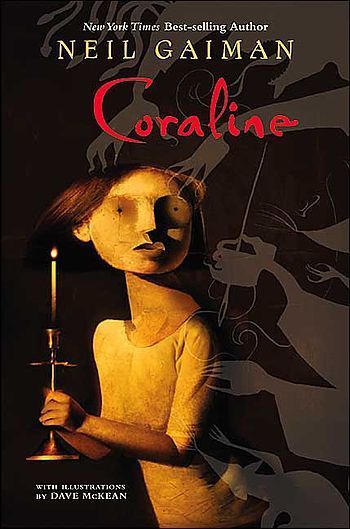 Coraline (Photo credit: Wikipedia)The theme for today is actually quite straightforward. It's 'Favourite epigraph', which, as the Books Are My Bag.com promotion relates to books, I assume to mean a literary epigraph. So, I've chosen the following, though I haven't yet read the book:
Coraline (Photo credit: Wikipedia)The theme for today is actually quite straightforward. It's 'Favourite epigraph', which, as the Books Are My Bag.com promotion relates to books, I assume to mean a literary epigraph. So, I've chosen the following, though I haven't yet read the book:'Fairy Tales are more than true: not because they tell us that dragons exist, but because they tell us that dragons can be beaten.' G.K. Chesterton
Quoted by Neil Gaiman in Coraline.
Of course, as a writer of fiction, and especially of speculative fiction, I am always in favour of any sensible quote that elevates the status of stories. But the quote is accurate. That's what stories do for us; they tell us what is possible.
Don't forget to use the #tag, #bookadayUK if you decide to join this promotion. But, more importantly, don't forget to visit your local independent bookshop (if you're lucky enough to have one in your vicinity) and BUY a book there. It's the only way we'll keep these vital outlets going and a wonderful way to erode the growing power and control of the online retail giants.
Published on October 27, 2014 02:41
October 26, 2014
#BookADayUK; A Reader Event For October. Day 26
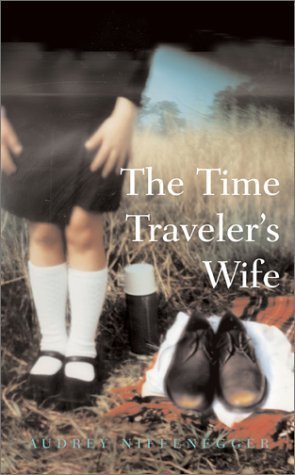 The Time Traveler's Wife (Photo credit: Wikipedia)Today's theme, somewhat lately responded to, is 'Clocks go back! Best book on time-travel'. Now, of course, I could cite the classic H.G. Wells' The Time Machine, but that's bound to be promoted by thousands. Mind you, my own choice here is also likely to be very popular. I've chosen The Time Traveller's Wife, by Audrey Niffenegger. It's a great story and well written. I reviewed it on here after reading it and you can read that review by clicking on this link, should you feel so inclined.
The Time Traveler's Wife (Photo credit: Wikipedia)Today's theme, somewhat lately responded to, is 'Clocks go back! Best book on time-travel'. Now, of course, I could cite the classic H.G. Wells' The Time Machine, but that's bound to be promoted by thousands. Mind you, my own choice here is also likely to be very popular. I've chosen The Time Traveller's Wife, by Audrey Niffenegger. It's a great story and well written. I reviewed it on here after reading it and you can read that review by clicking on this link, should you feel so inclined.Related articles [image error] Audrey Niffenegger: Why my Manchester Lit Fest sermon confesses my inadequacies [image error] The Time Machine Novel and Movie Adaptations [image error] The Time Machine (1960)
Published on October 26, 2014 13:23
Writing and Running for ME/CFS #5
 Training progress for this week.The running goes well. This week I had to do 3 x 3 minute runs followed by 3 x 1 minute walks followed by 3 x 2 minute runs followed by 3 30 seconds of walking on Tuesday. Friday was a 40 minute easy walk. Today I did my second 10 minute easy run. I knew I'd find this a bit tougher, as I had a 'flu jab yesterday and am suffering a minor level of the usual symptoms, but I thought the run might help disperse those negative effects so went ahead anyway. Glad I did, as I completed the run in the right time. So, still on course.
Training progress for this week.The running goes well. This week I had to do 3 x 3 minute runs followed by 3 x 1 minute walks followed by 3 x 2 minute runs followed by 3 30 seconds of walking on Tuesday. Friday was a 40 minute easy walk. Today I did my second 10 minute easy run. I knew I'd find this a bit tougher, as I had a 'flu jab yesterday and am suffering a minor level of the usual symptoms, but I thought the run might help disperse those negative effects so went ahead anyway. Glad I did, as I completed the run in the right time. So, still on course.The writing is still at the preparation stage, a bit more research and a start on curating the diary entries to determine which pieces I need to include. So, that's also on course, though I do hope to make a start on the actual writing some time this week.
As Dan, my publisher at Fantastic Books Publishing would say, 'Onward!'
Published on October 26, 2014 04:38
#BookADayUK; A Reader Event For October. Day 25
 I missed yesterday's piece on the #bookadayUK topic - too busy with other things. But I'll do a brief piece now, before I do today's.
I missed yesterday's piece on the #bookadayUK topic - too busy with other things. But I'll do a brief piece now, before I do today's.The theme was 'Mmmmm! Most memorable food/drink moment in literature'. I could point out the pre-sex scene in Tom Jones, but I suspect that's very well known. Beyond that, I couldn't think of anything to begin with. Then I recalled the spoof restaurant critic review that takes the form of a darkly humorous story in my speculative fiction collection, Ten Tales for Tomorrow.
The story, A Gastronomic Treat at the Edge of the Galaxy, details the experiences of an alien restaurant critic on a tour of our solar system and discovering some edible delights on planet Earth. Those who've read the story have enjoyed it. Might be worth a look.
Related articles [image error] #BookADayUK; A Reader Event For October. Day 18
Published on October 26, 2014 04:25
October 24, 2014
#BookADayUK; A Reader Event For October. Day 24
 Today, following the daily threads proposed by the Books Are My Bag.com promotion of
Today, following the daily threads proposed by the Books Are My Bag.com promotion of independent bookshops, we are urged to consider, 'A hidden gem'.
Now, what is hidden for some may well be openly on show for others. So, this, like so many of the others in this series, has to be a personal perception. I've decided to go with a book written by a friend, a work I think deserves a wider readership than it has so far achieved. Many books today fail to reach the readership they deserve simply because there are so many books published. This book, the second in a series, is a real gem. So, I nominate Linda Acaster's The Bull at the Gate. You can read my review of it here on the blog by clicking on this link.
Related articles
 #BookADayUK; A Reader Event For October. Day 7
#BookADayUK; A Reader Event For October. Day 7
 News: Books Are My Bag 2014
News: Books Are My Bag 2014
 October is #BookADayUK - Enjoy!
October is #BookADayUK - Enjoy!
 #BookADayUK; A Reader Event For October.
#BookADayUK; A Reader Event For October.
Published on October 24, 2014 04:14
The Narrative Poems, by William Shakespeare, Reviewed.
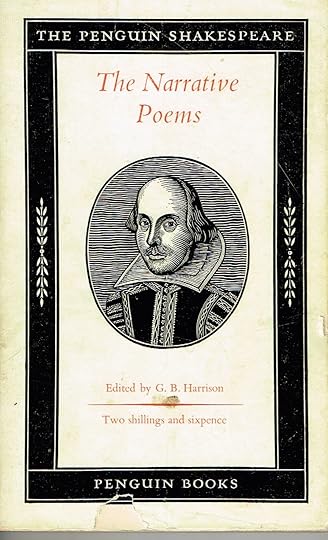 I always feel nervous commenting on the works of the Bard. After all, as England’s foremost dramatist, he has one hell of a reputation. Part of my anxiety stems from simple ignorance: a lack of knowledge of the times in which he wrote, and large holes in my understanding of the vocabulary he used. It is easy to misunderstand or misinterpret his work.
I always feel nervous commenting on the works of the Bard. After all, as England’s foremost dramatist, he has one hell of a reputation. Part of my anxiety stems from simple ignorance: a lack of knowledge of the times in which he wrote, and large holes in my understanding of the vocabulary he used. It is easy to misunderstand or misinterpret his work.All the same, as a modern reader of a classic work, I have a voice and an opinion. I hope readers of my reviews understand that they are personal and only as informed as those of most readers who also write.
So, to The Narrative Poems: this volume contains, Venus and Adonis, The Rape of Lucrece, and The Phoenix and Turtle. I read the Penguin Shakespeare edition, so there are some notes, an introduction and an epilogue to guide readers.
There is no doubt that Shakespeare was a superb poet. But these are works very much of their time, in spite of their reputation as classics. Classics, because they use language in an evocative and engaging way. Of their time, because they are rather more wordy than a modern reader would generally prefer. Although it takes the author several verses to say what modern writers would say in one, the manner of the exposition is so brilliant that wordiness is more easily forgiven. That said, there were short passages I skipped because they seemed superfluous.
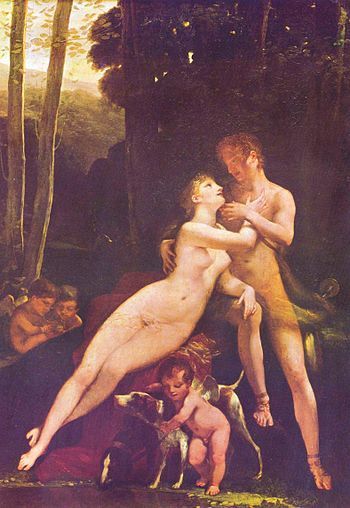 Pierre-Paul Prud'hon's Venus and Adonis, Wallace Collection, London (Photo credit: Wikipedia)Venus and Adonis retells an ancient myth in the typical style of the poet and does so very well, of course. The Rape of Lucrece again tackles an old story, but what is most noticeable about this one is its extremely moral stance. At the time of the Bard, women were routinely ‘owned’ and abused, yet the language of this work expresses such disgust over the actions of the rapist, Tarquin, and such empathy with the victim, Lucrece, that it might have been written by a modern man. The Phoenix and Turtle, however, is all but incomprehensible without a translation or some reference to the original work from which it is undoubtedly derived.
Pierre-Paul Prud'hon's Venus and Adonis, Wallace Collection, London (Photo credit: Wikipedia)Venus and Adonis retells an ancient myth in the typical style of the poet and does so very well, of course. The Rape of Lucrece again tackles an old story, but what is most noticeable about this one is its extremely moral stance. At the time of the Bard, women were routinely ‘owned’ and abused, yet the language of this work expresses such disgust over the actions of the rapist, Tarquin, and such empathy with the victim, Lucrece, that it might have been written by a modern man. The Phoenix and Turtle, however, is all but incomprehensible without a translation or some reference to the original work from which it is undoubtedly derived.Did I enjoy the read? Yes. Was some of it hard work? Yes. Did it put me off reading more of Shakespeare? No. Scholars and those acquainted with his works, will need no input from me. Those less familiar with the work of the Bard should find this slim volume worth their time. I suggest you have a read.Related articles
 Shaping English, Part One: People who Innovated English
Shaping English, Part One: People who Innovated English
Published on October 24, 2014 03:03
October 23, 2014
#BookADayUK; A Reader Event For October. Day 23
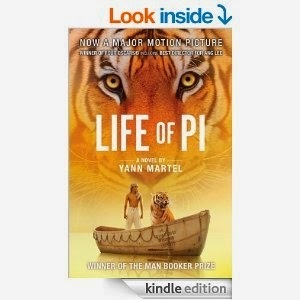 The theme for today is 'Best book on diversity'. I confess to being a little puzzled by this particular label. Diversity is a term that can be applied in many different ways. So, I looked it up on Goodreads and discovered that, in this context, it's a label indicating that a major character is of a non-Caucasian origin.
The theme for today is 'Best book on diversity'. I confess to being a little puzzled by this particular label. Diversity is a term that can be applied in many different ways. So, I looked it up on Goodreads and discovered that, in this context, it's a label indicating that a major character is of a non-Caucasian origin.I suppose I could have been silly, and nominated something like Lord of the Rings , with it's hobbits and other mythical creatures. But that hardly seems in the spirit of the thing. When I considered, I realised I'd read a fair number of books featuring non-Caucasian heroes, heroines and others. Salman Rushdie's Oeuvre is generally centred on races other than the Caucasian, and I've enjoyed a few of his works.
And, of course, I could have nominated the recent anthology of Epitaphs to which I contributed as one of seventy-two poets, many of whom were Indian, but that's not really what this is about either.
In line with what I've tried to do here in most cases, I decided to select the book most recently read that falls under this label. So, it looks as though it's going to be the Life of Pi, which I thoroughly enjoyed.
Related articles
 #bookadayuk: Day 22: Makes Me Want to Travel
#bookadayuk: Day 22: Makes Me Want to Travel
 #BookADayUK; A Reader Event For October. Day 18
#BookADayUK; A Reader Event For October. Day 18
 October is #BookADayUK - Enjoy!
October is #BookADayUK - Enjoy!
Published on October 23, 2014 04:07
October 22, 2014
#BookADayUK; A Reader Event For October. Day 22
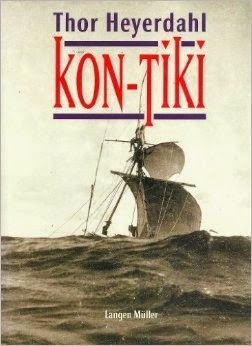 Okay, so what happened to day 21? Well, the truth is that I was rather otherwise occupied. A neighbour, who was kind and influential during my teenage years, died last week and I attended her funeral, some distance away, yesterday.
Okay, so what happened to day 21? Well, the truth is that I was rather otherwise occupied. A neighbour, who was kind and influential during my teenage years, died last week and I attended her funeral, some distance away, yesterday.But you managed the 'Word tips' post! Yes, that was scheduled, you see?
Anyway, today's theme is 'Makes me want to travel'. Once again, I am persuaded to delve into the past. There is no doubt that reading The Kon-Tiki expedition as a young man fired up my desire to travel. That I was hampered by my first wife, who would neither fly nor travel by sea, somewhat restricted me to this island home. However, my lovely second wife, with whom I've shared 26 years of happiness, is a traveller and treated me to my first trip overseas on my 40th birthday. A fortnight in Rhodes was a real eye-opener and we've visited many more of the Greek islands subsequently.
But it was undoubtedly Thor Heyerdahl's account of his adventures on the oceans that inspired me to travel. It's decades since I read his first book, and I've read most of his others since. Great stuff. If you haven't sampled this author, I suggest you do. You'll learn a little history and geography along the way.
Related articles
 Kon-Tiki
Kon-Tiki
 The Kon-Tiki man at 100 - and his kindred spirits in Maine
The Kon-Tiki man at 100 - and his kindred spirits in Maine
 Thor Heyerdahl's 100th Birthday Marked by a Google Doodle
Thor Heyerdahl's 100th Birthday Marked by a Google Doodle
 Thor Heyerdahl: Retrospective on an adventurous anthropologist
Thor Heyerdahl: Retrospective on an adventurous anthropologist
 Celebrating Those Adventurers of the Heart
Celebrating Those Adventurers of the Heart
 #BookADayUK; A Reader Event For October. Day 18
#BookADayUK; A Reader Event For October. Day 18
Published on October 22, 2014 04:20



